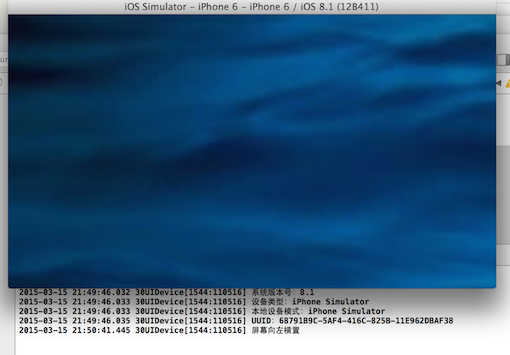IOS UIDevice & IOS检测屏幕旋转实例
一 UIDevice 简介
UIDevice类提供了一个单例实例代表当前的设备。从这个实例中可以获得的信息设备,比如操作系统名称、电池电量值(batteryLevel)、电池状态(batteryState)、设备的类型(model,比如iPod、iPhone等)、设备的系统(systemVersion)
二 获取 UIDevice 实例
通过[UIDevice currentDevice]可以获取这个单粒对象
UIDevice *device = [UIDevice currentDevice];
三 UIDevice 常用属性
通过UIDevice相关属性,可用获取设备信息
//设备名称 e.g. "My iPhone" NSString *strName = [[UIDevice currentDevice] name]; NSLog(@"设备名称:%@", strName); /** * 系统名称 e.g. @"iOS" */ NSString *strSysName = [[UIDevice currentDevice] systemName]; NSLog(@"系统名称:%@", strSysName); /** * 系统版本号 e.g. @"4.0" */ NSString *strSysVersion = [[UIDevice currentDevice] systemVersion]; NSLog(@"系统版本号:%@", strSysVersion); /** * 设备类型 e.g. @"iPhone", @"iPod touch" */ NSString *strModel = [[UIDevice currentDevice] model]; NSLog(@"设备类型:%@", strModel); /** * 本地设备模式 localized version of model */ NSString *strLocModel = [[UIDevice currentDevice] localizedModel]; NSLog(@"本地设备模式:%@", strLocModel); /** * UUID 可用于唯一地标识该设备 */ NSUUID *identifierForVendor = [[UIDevice currentDevice] identifierForVendor]; NSLog(@"strIdentifierForVendor:%@", identifierForVendor.UUIDString);
四 UIDevice 通知
UIDevice对象会不间断地发布一些通知,下列是UIDevice对象所发布通知的名称常量:
4.1 设备旋转
UIDeviceOrientationDidChangeNotification
4.2 电池状态改变
UIDeviceBatteryStateDidChangeNotification
4.3 电池电量改变
UIDeviceBatteryLevelDidChangeNotification
4.4 近距离传感器(比如设备贴近了使用者的脸部)
UIDeviceProximityStateDidChangeNotification
五 IOS检测屏幕旋转 UIDeviceOrientationDidChangeNotification 使用举例(其他通知方式类推)
屏幕的旋转朝向可以通过 [[UIDevice currentDevice]orientation] 判断,orientation是个Integer类型,每个值表示相应的朝向,必须在调用beginGeneratingDeviceOrientationNotifications方法后,此orientation属性才有效,否则一直是0。
orientation 对应的枚举值
typedef NS_ENUM(NSInteger, UIDeviceOrientation) {
UIDeviceOrientationUnknown,
UIDeviceOrientationPortrait, // Device oriented vertically, home button on the bottom
UIDeviceOrientationPortraitUpsideDown, // Device oriented vertically, home button on the top
UIDeviceOrientationLandscapeLeft, // Device oriented horizontally, home button on the right
UIDeviceOrientationLandscapeRight, // Device oriented horizontally, home button on the left
UIDeviceOrientationFaceUp, // Device oriented flat, face up
UIDeviceOrientationFaceDown // Device oriented flat, face down
};
5.1 注册通知
/** * 开始生成 设备旋转 通知 */ [[UIDevice currentDevice] beginGeneratingDeviceOrientationNotifications]; /** * 添加 设备旋转 通知 * * 当监听到 UIDeviceOrientationDidChangeNotification 通知时,调用handleDeviceOrientationDidChange:方法 * @param handleDeviceOrientationDidChange: handleDeviceOrientationDidChange: description * * @return return value description */ [[NSNotificationCenter defaultCenter] addObserver:self selector:@selector(handleDeviceOrientationDidChange:) name:UIDeviceOrientationDidChangeNotification object:nil ];
5.2 销毁通知
/** * 销毁 设备旋转 通知 * * @return return value description */ [[NSNotificationCenter defaultCenter] removeObserver:self name:UIDeviceOrientationDidChangeNotification object:nil ]; /** * 结束 设备旋转通知 * * @return return value description */ [[UIDevice currentDevice]endGeneratingDeviceOrientationNotifications];
5.3 旋转识别
- (void)handleDeviceOrientationDidChange:(UIInterfaceOrientation)interfaceOrientation
{
//1.获取 当前设备 实例
UIDevice *device = [UIDevice currentDevice] ;
/**
* 2.取得当前Device的方向,Device的方向类型为Integer
*
* 必须调用beginGeneratingDeviceOrientationNotifications方法后,此orientation属性才有效,否则一直是0。orientation用于判断设备的朝向,与应用UI方向无关
*
* @param device.orientation
*
*/
switch (device.orientation) {
case UIDeviceOrientationFaceUp:
NSLog(@"屏幕朝上平躺");
break;
case UIDeviceOrientationFaceDown:
NSLog(@"屏幕朝下平躺");
break;
//系統無法判斷目前Device的方向,有可能是斜置
case UIDeviceOrientationUnknown:
NSLog(@"未知方向");
break;
case UIDeviceOrientationLandscapeLeft:
NSLog(@"屏幕向左横置");
break;
case UIDeviceOrientationLandscapeRight:
NSLog(@"屏幕向右橫置");
break;
case UIDeviceOrientationPortrait:
NSLog(@"屏幕直立");
break;
case UIDeviceOrientationPortraitUpsideDown:
NSLog(@"屏幕直立,上下顛倒");
break;
default:
NSLog(@"无法辨识");
break;
}
}
5.4 结果演示
 输出 "屏幕向左横置"
输出 "屏幕向左横置"
5.5 完整代码
//
// ViewController.m
//
#import "ViewController.h"
@interface ViewController ()
/**
* UIImageView
*/
@property(nonatomic,strong)UIImageView *imageView;
@end
@implementation ViewController
- (void)handleDeviceOrientationDidChange:(UIInterfaceOrientation)interfaceOrientation
{
//1.获取 当前设备 实例
UIDevice *device = [UIDevice currentDevice] ;
/**
* 2.取得当前Device的方向,Device的方向类型为Integer
*
* 必须调用beginGeneratingDeviceOrientationNotifications方法后,此orientation属性才有效,否则一直是0。orientation用于判断设备的朝向,与应用UI方向无关
*
* @param device.orientation
*
*/
switch (device.orientation) {
case UIDeviceOrientationFaceUp:
NSLog(@"屏幕朝上平躺");
break;
case UIDeviceOrientationFaceDown:
NSLog(@"屏幕朝下平躺");
break;
//系統無法判斷目前Device的方向,有可能是斜置
case UIDeviceOrientationUnknown:
NSLog(@"未知方向");
break;
case UIDeviceOrientationLandscapeLeft:
NSLog(@"屏幕向左横置");
break;
case UIDeviceOrientationLandscapeRight:
NSLog(@"屏幕向右橫置");
break;
case UIDeviceOrientationPortrait:
NSLog(@"屏幕直立");
break;
case UIDeviceOrientationPortraitUpsideDown:
NSLog(@"屏幕直立,上下顛倒");
break;
default:
NSLog(@"无法辨识");
break;
}
}
- (void)viewDidLoad {
//设备名称 e.g. "My iPhone"
NSString *strName = [[UIDevice currentDevice] name];
NSLog(@"设备名称:%@", strName);
/**
* 系统名称 e.g. @"iOS"
*/
NSString *strSysName = [[UIDevice currentDevice] systemName];
NSLog(@"系统名称:%@", strSysName);
/**
* 系统版本号 e.g. @"4.0"
*/
NSString *strSysVersion = [[UIDevice currentDevice] systemVersion];
NSLog(@"系统版本号:%@", strSysVersion);
/**
* 设备类型 e.g. @"iPhone", @"iPod touch"
*/
NSString *strModel = [[UIDevice currentDevice] model];
NSLog(@"设备类型:%@", strModel);
/**
* 本地设备模式 localized version of model
*/
NSString *strLocModel = [[UIDevice currentDevice] localizedModel];
NSLog(@"本地设备模式:%@", strLocModel);
/**
* UUID 可用于唯一地标识该设备
*/
NSUUID *identifierForVendor = [[UIDevice currentDevice] identifierForVendor];
NSLog(@"UUID:%@", identifierForVendor.UUIDString);
/**
* UIImage 对象
*/
UIImage *image = [UIImage imageNamed:@"scroll.jpg"];
self.imageView.image = image;
// 设置图片范围
CGFloat imageH = image.size.height;
CGFloat imageW = image.size.width;
CGFloat imageX = 0;
CGFloat imageY = 0;
self.imageView.frame = CGRectMake(imageX, imageY, imageW, imageH);
[self.view addSubview:self.imageView];
[super viewDidLoad];
// Do any additional setup after loading the view, typically from a nib.
}
-(void)viewDidAppear:(BOOL)animated
{
/**
* 开始生成 设备旋转 通知
*/
[[UIDevice currentDevice] beginGeneratingDeviceOrientationNotifications];
/**
* 添加 设备旋转 通知
*
* @param handleDeviceOrientationDidChange: handleDeviceOrientationDidChange: description
*
* @return return value description
*/
[[NSNotificationCenter defaultCenter] addObserver:self
selector:@selector(handleDeviceOrientationDidChange:)
name:UIDeviceOrientationDidChangeNotification
object:nil
];
}
-(void)viewDidDisappear:(BOOL)animated
{
/**
* 销毁 设备旋转 通知
*
* @return return value description
*/
[[NSNotificationCenter defaultCenter] removeObserver:self
name:UIDeviceOrientationDidChangeNotification
object:nil
];
/**
* 结束 设备旋转通知
*
* @return return value description
*/
[[UIDevice currentDevice]endGeneratingDeviceOrientationNotifications];
}
- (void)didReceiveMemoryWarning {
[super didReceiveMemoryWarning];
// Dispose of any resources that can be recreated.
}
#pragma 懒加载
- (UIImageView *)imageView
{
if (!_imageView) {
_imageView = [[UIImageView alloc] init];
}
return _imageView;
}
@end
郑重声明:本站内容如果来自互联网及其他传播媒体,其版权均属原媒体及文章作者所有。转载目的在于传递更多信息及用于网络分享,并不代表本站赞同其观点和对其真实性负责,也不构成任何其他建议。





































